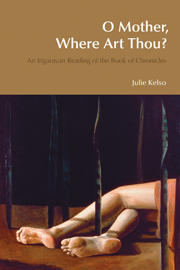Book contents
- Frontmatter
- Dedication
- Contents
- Acknowledgments
- INTRODUCTION: A QUESTION OF SILENCE
- PART I FEMINISM, PSYCHOANALYSIS, AND THE HEBREW BIBLE: “INTRODUCING” LUCE IRIGARAY
- Part II OUR PRODUCTION OF A PAST, IN THE PRESENT OF ANALAYSIS: ENGAGING WITH THE BOOK OF CHRONICLES
- Conclusion
- Notes
- Bibliography
- Index of References
- Index of Authors
PART I - FEMINISM, PSYCHOANALYSIS, AND THE HEBREW BIBLE: “INTRODUCING” LUCE IRIGARAY
- Frontmatter
- Dedication
- Contents
- Acknowledgments
- INTRODUCTION: A QUESTION OF SILENCE
- PART I FEMINISM, PSYCHOANALYSIS, AND THE HEBREW BIBLE: “INTRODUCING” LUCE IRIGARAY
- Part II OUR PRODUCTION OF A PAST, IN THE PRESENT OF ANALAYSIS: ENGAGING WITH THE BOOK OF CHRONICLES
- Conclusion
- Notes
- Bibliography
- Index of References
- Index of Authors
Summary
No one method, form of writing, speaking position, mode of argument can act as representative, model or ideal for feminist theory. Instead of attempting to establish a new theoretical norm, feminist theory seeks a new discursive space, a space where women can write, read and think as women. This space will encourage a proliferation of voices, instead of a hierarchical structuring of them, a plurality of perspectives and interests instead of the monopoly of the one – new kinds of questions and different kinds of answers
(Grosz, 1986: 203–204)My reading and analysis of the books of Chronicles takes place through the double lens of feminism and psychoanalysis. While certain feminist methods across a multitude of disciplines have long been associated with various psychoanalytic approaches (i.e. Freudian, Lacanian, Kleinian Object Relations, etc.), it is acknowledged that feminism and psychoanalysis have a complex and contentious relationship, one, however, I interpret as ultimately productive. This problematic, yet productive relationship is radically evident in the work of Luce Irigaray, the feminist philosopher and psychoanalyst with whom I engage in this book. In the next two chapters, I shall outline those theoretical and methodological aspects of Irigaray's earlier work that I insist are most relevant to the task of providing a feminist psychoanalytic reading and analysis of Chronicles.
- Type
- Chapter
- Information
- O Mother, Where Art Thou?An Irigarayan Reading of the Book of Chronicles, pp. 15 - 21Publisher: Acumen PublishingPrint publication year: 2008



